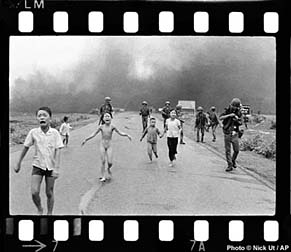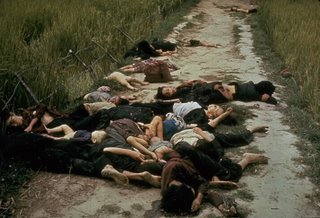It's Not About What You "Believe" To Be True
One form of argument that is very prevalent today and displays a fundamental disregard for research and for history is the one that goes like this: “Because I don’t believe it, it is not true.” You see this trope in the political arena as well as prevalent among political blogs. Today, for example, after the report that the missing GIs in Iraq had been tortured before they were killed, a right wing blogger wrote that he didn’t believe “Kerry's absurd assertion that American soldiers ‘terroriz[e] kids and children’,” or Jane Fonda’s assertion that “US troops have been trained to commit atrocities against innocent civilians.” Not that anything could justify this type of brutality against our soldiers (remembering, please, that I served overseas in the U.S. Army from 1970- through 1972), it is interesting to dissect the blogger’s ability to understand the truth.
 This ability to discern “the truth,” comes, of course, only from research. The truth is not something you “believe in,” but rather something you have documented and analyzed through careful research. For instance, as to Kerry’s claim, just look at these images: the image to the left is the world-famous shot of a young girl fleeing a Vietnamese village that has just been napalmed by US forces. The image above is of the equally notorious My Lai massacre. Surely these children are “innocent” in all regards. Are you not glad they are not your children? Think about that. And for those who are skeptical about the Internet – just travel to the National Archives in
This ability to discern “the truth,” comes, of course, only from research. The truth is not something you “believe in,” but rather something you have documented and analyzed through careful research. For instance, as to Kerry’s claim, just look at these images: the image to the left is the world-famous shot of a young girl fleeing a Vietnamese village that has just been napalmed by US forces. The image above is of the equally notorious My Lai massacre. Surely these children are “innocent” in all regards. Are you not glad they are not your children? Think about that. And for those who are skeptical about the Internet – just travel to the National Archives in
And Jane Fonda’s assertion, as ill-timed as it was, is, unfortunately an historical fact dating from the days of George Armstrong Custer. Countless readily available diaries of soldiers, not to mention press editorials, document in grave detail the utter disregard for the live of women and children as US soldiers fought battles against indigenous populations from
The point of my own argument here is not to disparage our own troops –I learned in Basic Training at Ft. Bragg, NC, in the hot and historical summer of 1969, that war is a nasty business and the goal, as in pro-football, is to survive and win at any cost. However, unless we are able to face our own reality, to learn the lessons of our own history, today’s so-called “War on Terrorism” is doomed to fail.
The rest of the world, in today’s new nuclear age with N. Korea and



